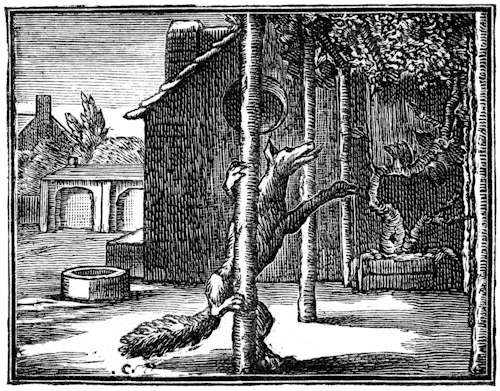The Fox & The Grapes
Illustrates Cognitive Dissonance, False Narratives, Self-Sabotage
Agile teams and organizations often set goals for agility, innovation, or delivery speed, only to later downplay their importance when they are not immediately reached. The Aesop fable of The Fox and the Grapes1 captures this subtle but dangerous behavior. It reminds us how easily we protect our ego at the cost of growth, and how critical it is to coach teams out of learned helplessness and into intentional improvement.

One summer afternoon, a hungry fox wandered into a vineyard. High above on the vine, he spotted a cluster of ripe, purple grapes. His mouth watered. He leapt once. He missed. He tried again and again, but the grapes were always out of reach.
Frustrated and tired, the fox gave up. As he walked away, he muttered to himself, "Those grapes were probably sour anyway."
Lessons Learned
Rationalization Masks Growth Opportunities
The fox didn't get the grapes, but instead of examining why, he changed the story to make himself feel better. Agile teams often do the same when faced with failure or limits: "That feature wasn't needed anyway" or "We're just not a DevOps shop." These narratives offer comfort, but block learning. Leaders and teams must learn to sit with disappointment long enough to inspect it honestly.
False Narratives Stall Progress
Saying the grapes are sour protects ego, but it also prevents change. Agile coaches see this when teams reject Scrum after one bad experience, or blame "Agile" when what they practiced was a shallow implementation. Teams must be taught to distinguish between disappointment and disillusionment. The first invites change. The second shuts it down.
Ambition Without Adaptation Fails
The fox had a goal but lacked the strategy or tools to reach it. He didn't try a new approach, ask for help, or build a better ladder. In organizations, we often see high aspirations paired with low investment in learning or change. Agile is not wishful thinking. It is intentional learning, supported by adaptation and effort.
Defensiveness Is a Warning Sign
When individuals or teams become cynical, disengaged, or sarcastic, it may not mean they lack motivation. It may mean they are protecting themselves from the pain of prior failure. Coaches need to dig beneath surface cynicism to understand what the “sour grapes” really represent. Often, it's an earlier attempt that went unrewarded or unsupported.
Coaching Tips
- Listen for “Sour Grapes” Language: Phrases like “We tried that once” or “That won't work here” can signal a protective narrative. Invite the team to revisit the experience with fresh eyes.
- Make Space for Disappointment: Teams need psychological safety to talk about failure honestly. Avoid rushing to silver linings. Sometimes, naming the loss is the first step to learning from it.
- Reframe Failure as Feedback: Help teams shift from blame to curiosity. Ask what was learned, what could be tried differently, and how they might build capability over time.
- Connect Goals to Practice: If a team dreams of grapes, help them build the tools, processes, and resilience to reach them. Agile without execution is just aspiration.
In Agile work, not every leap reaches the fruit. But how we respond to setbacks reveals whether we are truly Agile or just pretending. The fox gave up and rewrote the story. Agile teams can do better. They can pause, reflect, and adapt. They can try again, not from the same angle, but with a smarter approach.
Don't let your team talk themselves out of the grapes they actually want. Help them find the ladder, build the strength, and try with intention.


